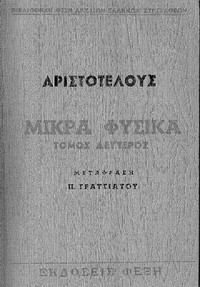Μικρά Φυσικά, Τόμος Δεύτερος by Aristotle
"Μικρά Φυσικά, Τόμος Δεύτερος" by Aristotle is a scientific publication likely written in the early centuries of the Common Era. This work focuses on various natural phenomena and human experiences, including the nature of dreams, their causes, and effects on perception, blending philosophy with empirical observation to understand sensory phenomena. The beginning of this volume explores the concept of dreams, asserting that they occur in the realm of the sensory rather than
the rational part of the psyche. Aristotle begins by discussing how dreaming differs from sensory perception during wakefulness, emphasizing that while one may experience vivid imagery in dreams, they are not controlled by external stimuli in the same way as when awake. He proposes that dreams are residual impressions of prior sensory experiences, offering insights into the workings of perception and imagination during sleep. Additionally, Aristotle examines how emotional and physical states can influence dreaming, hinting at a complex interplay between the mind and body in these nocturnal narratives. (This is an automatically generated summary.)
Read now or download (free!)
| Choose how to read this book | Url | Size | ||||
|---|---|---|---|---|---|---|
| Read online (web) | https://sendtokindle.compellingsciencefiction.com/ebooks/27896.html.images | 277 kB | ||||
| EPUB3 (E-readers incl. Send-to-Kindle) | https://sendtokindle.compellingsciencefiction.com/ebooks/27896.epub3.images | 134 kB |
Send
to kindle email: |
|||
| EPUB (no images, older E-readers) | https://sendtokindle.compellingsciencefiction.com/ebooks/27896.epub.noimages | 136 kB | ||||
| Kindle | https://sendtokindle.compellingsciencefiction.com/ebooks/27896.kf8.images | 242 kB | ||||
| older Kindles | https://sendtokindle.compellingsciencefiction.com/ebooks/27896.kindle.images | 228 kB | ||||
| Plain Text UTF-8 | https://sendtokindle.compellingsciencefiction.com/ebooks/27896.txt.utf-8 | 265 kB | ||||
| Download HTML (zip) | https://www.gutenberg.org/cache/epub/27896/pg27896-h.zip | 127 kB | ||||
| There may be more files related to this item. | ||||||
Similar Books
About this eBook
| Author | Aristotle, 385 BCE-323 BCE |
|---|---|
| Translator | Gratsiatos, Paulos |
| Title | Μικρά Φυσικά, Τόμος Δεύτερος |
| Alternate Title | Parva Naturalia (Little Physical Treatises) Vol. 2 |
| Credits | Produced by Sophia Canoni, book provided by Iason Konstantinidis |
| Language | Greek |
| LoC Class | PA: Language and Literatures: Classical Languages and Literature |
| Subject | Psychology -- Early works to 1850 |
| Category | Text |
| EBook-No. | 27896 |
| Release Date | Jan 26, 2009 |
| Most Recently Updated | Mar 12, 2012 |
| Copyright Status | Public domain in the USA. |
| Downloads | 147 downloads in the last 30 days. |
| Project Gutenberg eBooks are always free! | |

